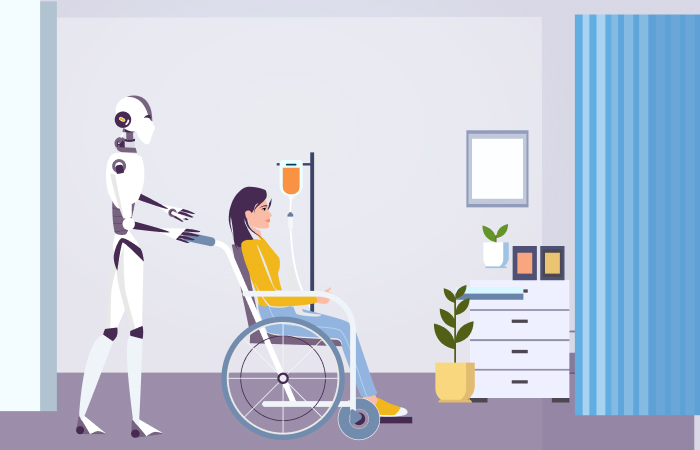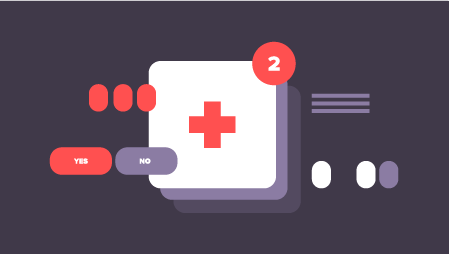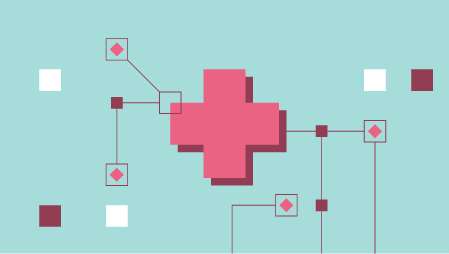Artificial Intelligence in primary health care is a hot and trending topic these days, and the healthcare sector is getting benefited from it in 2020, and beyond.
Business Insider reveals that AI in primary healthcare is expected to grow 48 per cent annually between 2017 and 2023.da
Not only AI, but its subset ML (Machine Learning) has intense potential to provide data-driven clinical decision support (CDS) to physicians and healthcare institutions. Machine learning is designed to identify patterns, uses algorithms and data to give automated insights to healthcare providers.
But, before we understand the significance of AI automation in healthcare, let’s first have a brief overview of what AI is in healthcare?
Artificial Intelligence in the healthcare sector has automated almost all the tasks and made it easy for healthcare professionals to save time and money. Tasks like pre-authorizing insurance, follow up on unpaid bills are a matter of seconds for healthcare experts.
Lets’ just see the key AI trends in the healthcare industry
1. Intelligent Process Automation
One of the key advantages of AI in healthcare trends is RPA (Robotics Process Automation) and IPA (Intelligent Process Automation). Employing these two technologies eradicates the delays and human mistakes from the equation.
IPA is highly beneficial for the pharma companies as it automates all the functions from manufacturing and support, through IT, finance and even through the clinical trials and R and D (Research and Development).
Machine Learning
AI with ML (Machine Learning) is used in healthcare institutions to provide informed reactions and decisions on the data. It is used as an interface between the patient and the hospital to analyse the data.
At first, with the help of ML algorithms, they look at the symptoms, the underlying conditions, demographic or social category of the patient and reach the final outcome. This helps in reducing the time duration for treating the patient.
The importance of ML in clinical trial efficiency has been underrated in certain cases. In the clinical value chain, it can be used for identifying cause and effect in the use of several agents within medicines.
In this way, it works much faster and in a more targeted way with the help of ML. AI solutions can be used in drug discovery. With the help of vast databases of information on existing devices, AI solutions can identify new potential therapies.
2. Risk Prevention and Intervention
Potentially preventable medical conditions account for $1 in every $10 of hospital spending, so millions of hospital stays and billions of dollars in care costs could be avoided with better risk prediction and interventions in the primary care setting.
For example, Phoenix-based Banner Health is using BaseHealth AI technology to predict risk for 42 health conditions to reduce emergency room and hospital utilization through primary care interventions.
With AI, you can identify and close care gaps. It will help in improving the healthcare provider’s performance and ensure quality payment programs. IBM and Siemens have shown a great impact on AI in healthcare by developing new population health tools using its Watson Health AI technology.
On Jan 13, 2011, IBM partnered with Siemens to develop this tool that is effective in population health management. IBM Watson’s ability to pinpoint treatments for cancer patients, and Google Cloud’s Healthcare app makes it easier for health organizations to collect, store, and access data.
Business Insider Intelligence reports that IBM Watson’s Genomic product identifies specific treatments for over 1000 patients. It analyses with the help of Big Data to determine treatment options for people suffering from tumours and genetic abnormalities.
3. AI paired with ML offers Informed Clinical Decisions
Google’s Cloud Healthcare API (application programming interface) includes CDS (clinical decision support) offerings and other AI solutions that help doctors make more informed clinical decisions regarding patients.
Clinical Doctors use AI in Google Cloud to extract data from users’ EHR (electronic health records) with the help of machine learning. – This helps the healthcare providers to make better clinical decisions and predict the outcomes of hospital visits.
With this, healthcare institutions can prevent readmissions and admit only those patients that are in urgent need or are in critical health conditions.
4. Medical Advice And Triage

Artificial Intelligence Doctors outperforms the doctors with their expert-level accuracy and delivers cost-effective healthcare. Babylon Health and HealthTap Inc are some of the healthcare companies who have developed AI technology and integrated it with team-based care models. It makes it easier for physicians to manage a patient panel.
AI has shown a revolutionary form of it in the field of medical advice and triage. Now, let me clarify to you the meaning of triage. Triage in the medical sense means the process of determining the priority of patient treatment.
The patients who are in severe conditions and have high probability of recovery are treated first. Also, there is one more parameter which is being followed in the triage concept that is they group the patients on the basis of their recovery with or without treatment.
5. Risk-adjusted Panelling and Resourcing
By setting panel sizes according to patient complexity, risk-adjusted paneling can help primary care physicians see patients in an efficient manner, which can boost patient satisfaction and curb physician burnout.
For example, University of California-San Francisco is using electronic health record (EHR) data on healthcare utilization to train algorithms that assess primary care panel sizes.
6. Device Integration
Nearly a quarter of Americans have wearable devices that collect health data such as vital signs, but this voluminous data is often unwieldy and incompatible with healthcare provider EHRs. AI technology such as Apple’s HealthKit has the potential to tame this cumbersome treasure trove of wearable-device data.
Integrating AI and developing machine-learning algorithms consists of two primary steps: feature engineering and classification. Feature engineering identifies features from a data set to be extracted for classification.
New AI advances in hardware and software have allowed engineers and scientists to interpret physiological data from sensors.
7. Diagnostics
AI algorithms have made diagnostics of several diseases much easier. Treatment of diseases like skin cancer, breast cancer, colorectal cancer, brain cancer, and cardiac arrhythmias have been made easier when treated by primary care physicians. Iowa City-based University of Iowa Health Care uses IDx-D.R to detect diabetic retinopathy.
8. Practice Management
AI can automate repetitive clerical tasks that create administrative burdens at primary care practices. For example, Olive uses AI technology to automate several clerical tasks, including insurance claims, prior authorizations, billing, and data reporting.
9. AI in Wearables
AI in wearables like the Fitbits and smartwatches have made things narrow between the patients and the doctors. It can analyse the data and alert the users and clinical experts about the potential health issues and risks.
Patients can easily access their health care conditions with the help of these AI based wearables and prevent themselves from unnecessary and frequent hospital visits and remissions.
Future of AI in Primary Care
AI in primary healthcare has revolutionized and redefined the healthcare industry. Over the time, from the mid-2000s, we have seen the use of EMR (electronic medical record) systems that digitises the patient record system.
AI has augmented tasks like decision making to decrease the cognitive burden on the healthcare providers. AI can identify the population of patients at risk and reduce health inequalities by surfacing the most vulnerable patients.
Widespread acceptance of AI outputs requires considerable further work to assure it a place as an additional and completely trusted source for direct patient care.
Conclusion
It’s obvious that the healthcare-based solutions have drawn a better future for it with the help of AI powered solutions amidst a plethora of issues in its ways.
Looming giants like Google, Amazon, Apple, and Microsoft are using their extensive power to reach into the broader technology universe that is the healthcare industry.
AI enabled healthcare solutions have enabled the patients, healthcare providers, payers and everyone in between to shape the future of primary health care. Though it is exciting, it’s confusing, sometimes optimistic and sometimes pessimistic, it is us who can understand the maturity of AI in healthcare and bring the fundamental changes to live with it.
If you also want to address the key issues of the global healthcare industry, implement AI into your healthcare solutions and see its substantial impact thereon. Hire developers from the top software development companies and get an AI solution that will transform your primary care.





